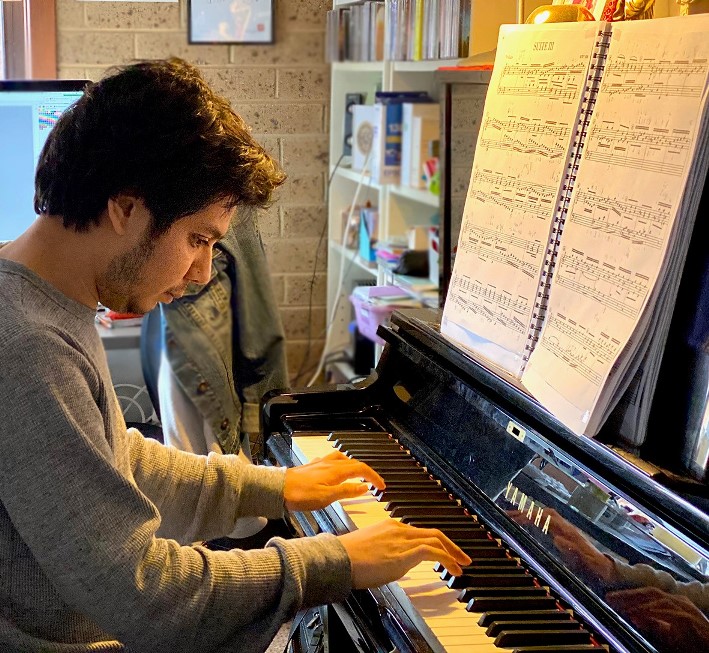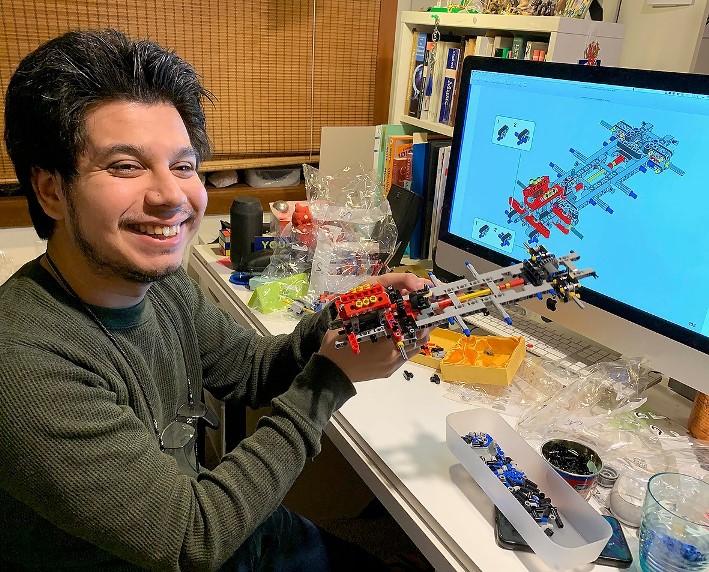Lenny is a Victorian community member with haemophilia
At the recent HFA webinar for World Haemophilia Day, Lenny spoke about his personal challenges, what he has done to overcome them and the exciting changes that had occurred for him in the last year.

Lenny playing piano
Photo: Lenny
Lenny has haemophilia A at 2% – technically moderate haemophilia, but he is treated as severe because of other medical complications from trauma at birth. As a result, he also has several other disabling conditions: hydrocephalus, acquired brain injury (ABI) vision loss, mild palsy and some learning difficulties.
Watch the video of Lenny’s story
Lenny explained how these medical challenges impact on him.
‘Hydrocephalus is caused by abnormally high pressure in the brain caused by the build-up of cerebrospinal fluid. Because of this I have a VP [ventriculoperitoneal] shunt which drains the excess spinal fluid from my brain.
‘The next challenge is I have is a rare form of ABI vision loss known as Parinaud (or Dorsal Midbrain Syndrome). This means I can only see with one eye at a time, and I have no control over when one eye switches off and the other one takes over. As well, both eyes have limited peripheral vision, and very limited up and down gaze. Because of the monocular vision, I have no depth perception and would trip over easily.
‘The other challenge is mild palsy which means that one side of my body is weaker than the other, which causes issues with my balance and mobility. All the above have affected in some way my ability to learn in mainstream education.’
Finding a way around his medical challenges led Lenny in a particular direction with his education and interests.
‘In terms of my vision impairment, technology has played a big part in my education and my daily life. I started to become acquainted with the computer since Prep and have learnt to touch type. Learning new software also comes naturally to me. This was a real asset during the lockdown as all my classes were conducted online and we mostly worked in isolation. In addition, I had to learn a new music software on my own to complete my music compositions in my final unit at university.
‘Reading music scores was fraught with difficulty due to my vision and coordination issues, however my piano teacher patiently encouraged me to read music notation.
‘Because of a fear of repeat shunt revisals surgery, I never felt safe doing sports, so I gravitated towards music. As a child I was fascinated and loved hearing the beautiful melodic sounds created by my aunts and cousins on the piano. With my limited vision, I would learn each part separately, and then learn to coordinate both hands and then ditch the book and play from memory. My short-term memory was severely impacted by all the neurosurgeries, but my long-term memory is fantastic.
‘I was surprised to discover that the due to my limited vision, my hearing is very acute, and it is perfect for music. Mum helps me enlarge the pages to A3 and often she has to increase the white space in between the staves.
‘As I am not involved in team sports — and classical piano is very much a solitary instrument — I picked up the clarinet — and joined the school band for several years until Year 12 when I had a severe cerebral bleed which hospitalised me for 6 weeks, and as a result I had to give it up.’
Lenny’s tertiary studies gave him an opportunity to pursue his interest in music – and to explore some of his own questions about the human mind.
‘Recently I completed a Bachelor of Arts with two majors in Music and Psychology. I chose psychology because I was intrigued to discover how my brain works and how people generally learn (even though I passed, I still don’t know!) Normally a 3-year course, I completed it on a half-time basis due to my vision impairment. Even though I completed all of my assessments by the deadline, it was a struggle to juggle my time between reading the textbooks, copious amounts of researching, and completing my assignments.’
‘During the 2020 lockdown, I struggled with collaborative assignments via Zoom. My study partners thought I was being lazy and uncooperative, but I was actually just slower because it took me so long to find relevant data on the internet. It was a dark moment in my student life, but once I told them about my vision impairment they were more understanding. It improved the whole experience.
 Lenny building lego models
Lenny building lego models
Photo: Lenny
Having haemophilia has always been a challenging experience for Lenny.
‘There was a time when I hated my condition. I couldn’t cope with the constant injections, which caused massive needle phobia. Even with all the challenges, I now realise that I can still count my blessings. I have had excellent medical care and support at both my paediatric and adult Haemophilia Treatment Centres.’
Then Lenny was offered the opportunity to change his treatment from a standard factor VIII replacement therapy to a new type of treatment, which mimics a clotting factor.
‘Changing my treatment has definitely been a Godsend.
‘When I was first told about the new regimen, I was excited as I only had to do it once a week as opposed to two to three times a week – which I needed for 22 years. Due to my vision impairment, I have always relied on one of my parents to do the injecting either via a port or intravenously. This new treatment is subcutaneous and has meant that I can do my own injections.
‘To my surprise, I found that the whole procedure was more straightforward and less complicated compared to the sterile procedure for the port as there are fewer components to organise. Preparation can take place over a smaller area and it takes less time, as there is no need for complex sterile setup. With this treatment you only need to swab the bottle tip as well as the injection site. With intravenous injections, I was always fearful of the needle hitting a nerve. At times the vein would hide/tissue mid-infusion and the whole procedure had to start all over again. That caused a lot of angst for me.
‘When I first saw the treatment kit I was so surprised to discover how small the vial and syringe were, and the little amount of product required compared to the normal factor VIII. The only challenge for me was reading the fine measurements which I managed to overcome by purchasing a cheap pair of magnifying glasses from the local chemist.
‘I did my first two treatments at the Haemophilia Treatment Centre under the supervision of the haemophilia nurses. Since then, I’ve been successfully self-infusing at home. As my confidence grows, I find that the transition has been smooth and without too many hassles. Overall, the whole experience has been positive and I think it will allow me more freedom and independence in the future.’
How would Lenny sum up his treatment experience?
‘For me, life now feels more in control because I can self-infuse instead of relying on my folks.’
Everybody has different requirements in relation to their treatment. HFA does not make recommendations about specific treatment products, but if you are interested and would like to discuss new treatment options for haemophilia, speak to the team at your Haemophilia Treatment Centre.
Haemophilia Foundation Australia acknowledges the Traditional Owners and Custodians of Country throughout Australia, the land, waters and community where we walk, live, meet and work. We pay our respects to Elders past and present and extend that respect to all Aboriginal and Torres Strait Islander peoples.
Sign up for the latest news, events and our free National Haemophilia magazine